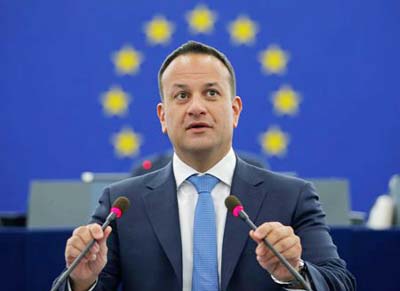
Reuters, Dublin :
Ireland would like Britain’s relationship with the European Union to be closer than that of non-member Norway, but it will have to be a specific agreement as there is no precedent for the relationship, Ireland’s prime minister said on Thursday.
“I think it will be a specific agreement for the United Kingdom. Of course as Ireland we want that to be as close as possible – we would have it ‘Norway-plus’ but I think we have to get into the detail now of what that means,” Leo Varadkar told Bloomberg Television in an interview in Davos, Switzerland.
Norway is part of the European Union’s single market, but not the customs union.
The EU’s chief Brexit negotiation Michel Barnier in December said the future free trade agreement between the European Union and Britain would have to be along the same lines as the one the EU has with Canada.
But Varadkar said that neither the Norwegian model nor the Canadian model would fit the United Kingdom.
“It’s difficult to compare it to Norway, which is a relatively small country… or a country like Canada, which is on a different continent,” he said.
While Britain has repeatedly said it will not remain in the EU customs union or single market, “perhaps we can negotiate something that isn’t very different to that,” Varadkar said.
Such a deal would, however, require the United Kingdom to realise that it cannot cherry pick benefits of EU membership without the corresponding responsibilities.
Access to European markets for London-based financial services firms would depend on what the UK might give in return, he said.
Meanwhile, The high turnover of ministers in the British government is hampering progress towards Brexit, a think-tank said Thursday. The merry-go-round of faces in Prime Minister Theresa May’s administration will also make it tougher for her to achieve her domestic objectives, the Institute for Government (IFG) said.
While May has kept her top four ministers in place since taking office in July 2016, the report found that 71 percent of ministers — 85 out of 122 — are new to their jobs since the June 2017 general election.
“Political turbulence and ministerial turnover-particularly at junior levels-have disrupted the government’s preparations for Brexit, its ability to pass crucial legislation and its capacity to deal with urgent public service challenges,” the institute said in a report.
Only Brexit minister David Davis and one of the four junior ministers have stayed at the Department for Exiting the European Union since its creation in July 2016, the month after Britain’s EU referendum.
Meanwhile every minister in the Cabinet Office and three-quarters of those in the justice ministry were replaced in this month’s reshuffle.
Both the Justice Department and the Work and Pensions Department have seen a third minister take the helm since May took office.
Ireland would like Britain’s relationship with the European Union to be closer than that of non-member Norway, but it will have to be a specific agreement as there is no precedent for the relationship, Ireland’s prime minister said on Thursday.
“I think it will be a specific agreement for the United Kingdom. Of course as Ireland we want that to be as close as possible – we would have it ‘Norway-plus’ but I think we have to get into the detail now of what that means,” Leo Varadkar told Bloomberg Television in an interview in Davos, Switzerland.
Norway is part of the European Union’s single market, but not the customs union.
The EU’s chief Brexit negotiation Michel Barnier in December said the future free trade agreement between the European Union and Britain would have to be along the same lines as the one the EU has with Canada.
But Varadkar said that neither the Norwegian model nor the Canadian model would fit the United Kingdom.
“It’s difficult to compare it to Norway, which is a relatively small country… or a country like Canada, which is on a different continent,” he said.
While Britain has repeatedly said it will not remain in the EU customs union or single market, “perhaps we can negotiate something that isn’t very different to that,” Varadkar said.
Such a deal would, however, require the United Kingdom to realise that it cannot cherry pick benefits of EU membership without the corresponding responsibilities.
Access to European markets for London-based financial services firms would depend on what the UK might give in return, he said.
Meanwhile, The high turnover of ministers in the British government is hampering progress towards Brexit, a think-tank said Thursday. The merry-go-round of faces in Prime Minister Theresa May’s administration will also make it tougher for her to achieve her domestic objectives, the Institute for Government (IFG) said.
While May has kept her top four ministers in place since taking office in July 2016, the report found that 71 percent of ministers — 85 out of 122 — are new to their jobs since the June 2017 general election.
“Political turbulence and ministerial turnover-particularly at junior levels-have disrupted the government’s preparations for Brexit, its ability to pass crucial legislation and its capacity to deal with urgent public service challenges,” the institute said in a report.
Only Brexit minister David Davis and one of the four junior ministers have stayed at the Department for Exiting the European Union since its creation in July 2016, the month after Britain’s EU referendum.
Meanwhile every minister in the Cabinet Office and three-quarters of those in the justice ministry were replaced in this month’s reshuffle.
Both the Justice Department and the Work and Pensions Department have seen a third minister take the helm since May took office.

